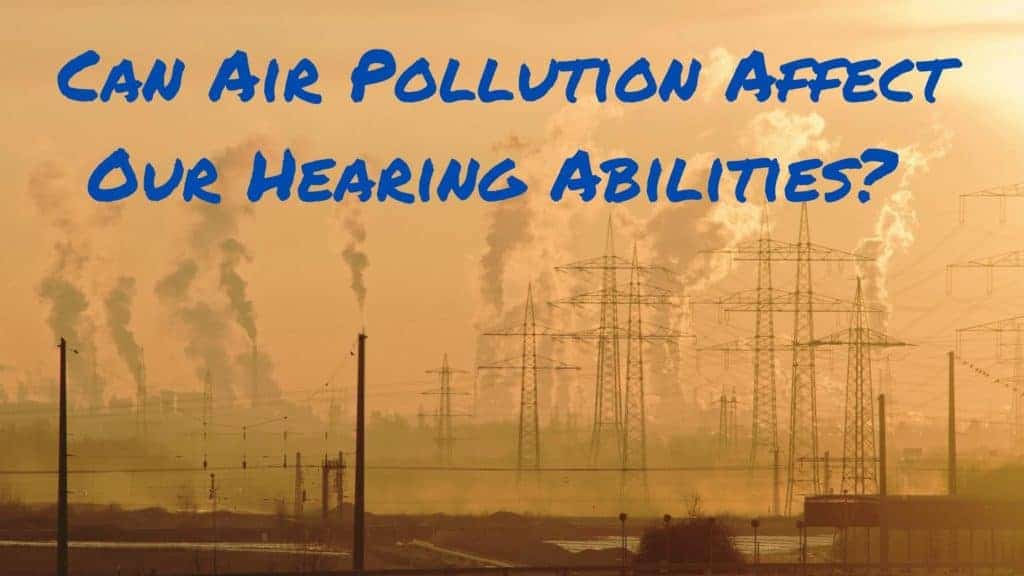
- How Hearing Tests Can Improve Your Communication Skills - November 4, 2025
- Why Busy Professionals Should Consider Mobile Hearing Services - October 26, 2025
- Key Differences Between Temporary and Permanent Hearing Loss - October 15, 2025
Hearing loss is one of the most pervasive medical conditions that people experience today. Impacting nearly 48 people million, an estimated 1 in 5 people have some degree of hearing loss according to the National Institute on Deafness and Other Communication Disorders. Hearing loss can be caused by a variety of factors including existing medical conditions, genetic history, environmental exposure to loud noise, and aging. In addition to these factors, recent research shows that air pollution can also contribute to the development of impaired hearing.
Link Between Air Pollution and Hearing Loss
A major study investigating the correlation between air pollution and hearing loss was recently published in March 2020. Published in the International Journal of Environmental Research and Public Health, this study was conducted by researchers with the Taiwan National Health Research Institutes. The study involved:
- Study: researchers used data from 74 air quality monitoring stations throughout Taiwan to measure concentrations of air pollutants (carbon monoxide and nitrogen dioxide) present in the air. This allowed them to map the parts of the country that experienced low, mid, and high levels of pollution. They then used data from a national health survey of 75,767 participants, ages 20 and older to assess any links between air pollution levels and hearing loss. The data involved in the study spans multiple years (1998 – 2010) and participants had no history of hearing loss in the beginning.
- Findings: after mapping and analyzing the data, researchers found that there was a correlation between hearing loss and air pollution. Compared to participants exposed to lower levels, hearing loss was:
- 1.63 times more likely for people exposed to higher levels of nitrogen dioxide
- 1.45 times more likely for people exposed to higher levels of carbon monoxide
These findings highlight that the risk of developing hearing loss was significantly higher for people exposed to more air pollution.
How Does Air Pollution Impact Hearing Health?
The study revealed that air pollution had profound harmful effects on the auditory system. Though more research is needed to identify the specific ways in which air pollution damages hearing health, researchers involved in the study have a few suggestions. Both air pollutants in the study – carbon monoxide and nitrogen dioxide – can damage the cells in critical ways. These toxins can prevent the body’s blood system from adequately carrying oxygen throughout the body. This includes the inner ear which is integral to the processing of sound.
The inner ear is composed of the cochlea which is filled with thousands of hair cells and fluid which help translate incoming soundwaves into electrical signals. Auditory pathways then carry these signals to the brain where they are further processed and assigned meaning to; allowing us to understand what we hear. Inadequate oxygen levels in the ear can damage these cells, reducing their capacity to effectively function. This makes it difficult then for the brain to process incoming sound information, resulting in permanent hearing loss.
Tips to Protect Hearing Health
Air pollution can be detrimental to hearing health. You can intervene to reduce the impact air pollution has on your health by integrating safety measures in your daily life. A few useful tips include the following:
- Reduce Exposure: prioritize ways to reduce your exposure to air pollution by checking the forecast and avoiding the outdoors when high levels are projected, avoid spending time around high traffic areas which increase pollution, reduce smoking or being around smoking, invest in an air purifier, wear face masks to reduce the amount of pollution in breathe in etc.
- Wear Protective Gear: Another useful way to protect your hearing is to wear protective gear for your ears. This can include: earmuffs, earplugs, headphones etc. which offer a protective barrier, reducing the amount of noise pollution you absorb. Exposure to loud noise is another common cause of hearing loss so wearing protective gear can be useful.
- Get Hearing Tested: hearing tests involve a noninvasive and painless process that measures your hearing ability in both ears. This establishes any impairment and the degree of hearing loss you could be experiencing. It is particularly important to have your hearing tested consistently if you are exposed to higher levels of pollution.
If you are ready to get your hearing tested, contact us today!
